- Home
- Jeff Gunhus
Resurrection America Page 4
Resurrection America Read online
Page 4
Which is why, even though he was shaken up by what had happened up at the mine, he couldn’t help but stop the Blazer and take some pride in all the activity in Town Square. Normally deserted on a Thursday morning, the streets were filled with pickup trucks and delivery vans. Volunteers raked leaves and put up vendor tents. There was a huge stage being erected in front of the town hall and a dozen men and women, most of them people Rick had known since grade school, were all smiles as they worked.
“Trying to get out of work, Sheriff?” came a woman’s voice from behind him. He startled and twisted to his left. Mayor Bertie Wilkens, an elegant woman in her sixties, (no one knew for sure if it was early or late sixties and she wasn’t telling), walked up next to the Blazer with a cup of coffee in her hand. She wore work clothes, jeans and a flannel shirt, that both had a little paint on them. A tall woman, she reminded Rick of a deer when she moved, graceful but always on guard.
She shook her head as she looked over the bruised and battered vehicle. It wasn’t lost on her that the town’s vehicle was missing a windshield.
“What happened here?”
“Had to go off-road to get around a fallen tree,” he said with a shrug, as if that explained everything.
“Probably cost more to replace the windshield than the hunk of junk is worth.” Every year, she offered to buy a new rig for him, but he didn’t see the need. It was a 2015 model, but it’d been a workhorse for nearly a decade and it was the only rig he’d ever used as sheriff. The suspension was a little stiff and it jostled him pretty good on the rougher roads, but it wasn’t like he was conducting high-speed chases down the freeway. The closest he ever came was when some of the Harley guys decided to get off the beaten track on their way up to the massive bike rally in Sturgis. If any of them wanted to outrun him, they could do so easily. But a new Blazer wouldn’t have made any difference. Harley Davidson, now that was one piece of American manufacturing that still got it right.
He’d known Bertie all his life, first as his mother’s friend, then as his junior high school principal and, since leaving the military, as his career counselor. She was the one who’d convinced him to run for sheriff. Mayor Bertie had been unopposed at the ballot for nearly twenty years and her popularity reached throughout the county. Her endorsement was all he needed and no-one else had put their name forward to challenge him. She was a force of nature and what little sense of community that was left in Resurrection came thanks to her efforts.
Normally, he’d be happy to see her, but after his interaction with Keefer, he’d planned to avoid her as best as possible. The fewer questions she asked, the less likely he’d be in a position to have to lie to her. And, like most politicians, Bertie was a talker.
“I’m ready to get to work,” he said. “I’m heading over to help old man Roberts get his grills out.” He rolled the Blazer forward a few inches, hoping Bertie would take the hint. Instead, she put a hand on the truck, causing him to put on the brakes.
“Heard he’s starting his world-famous pork tonight so it’ll be done and perfect by lunch tomorrow.”
Rick took a breath. He knew Bertie well enough that he wasn’t going to get out of there without a little jawboning. He played along.
“I’m helping him with it,” he said, trying to sound more relaxed than he felt. “Promised he’d share his secret recipe with me.”
“Gonna be the best Fall Festival yet,” Bertie said. “Bet we get over two thousand here by lunch.”
“Not if people find out I helped with the cooking. I’d suggest you keep that under wraps.”
As impatient as he was to get going, he always enjoyed an easy banter with her. He liked seeing her face glow as she watched her town come together to throw a party. It made him feel normal, just two public servants doing their jobs. And normal was all he wanted.
Things could have gone in a different direction for him, and Rick knew that. Bertie had taken a chance on him when he’d come back from the war a broken man, and not just because of the arm he was missing. Rumors followed him back into town, hushed conversations of a mission gone wrong in Istanbul. No one knew the details for sure, and no one was about to ask. Word got around quickly about the nightmares he suffered, and most people wondered how smart it was to give a man like him a gun and a badge. But she’d told people that Rick Johnson was Resurrection’s finest before he went off to war and he was even more qualified than ever now that he was back after traveling the world. She’d stuck her neck out for him, and he’d never forget it. Bertie could have told him to jump off a canyon wall and his only question would have been what she wanted him to yell as he did it.
“Where are you coming back from?” she asked.
He shifted uncomfortably in his seat, cursing himself for lingering too long. “Took a drive up the mountain. Clear my head a little.”
Bertie arched an eyebrow, exactly the way she used to when she was his school principal instead of his mayor and his employer. “Manny go with you? I haven’t seen him around.”
“Went out alone. Not sure where Manny is.” That part was true.
Her eyes narrowed and she pursed her lips together. “You’ve always had the worst poker face, Rick Johnson,” she said. “What aren’t you telling me?”
Rick looked out the windshield, trying to escape her eyes looking right through him. He couldn’t lie to her, not Bertie, so he chose to keep quiet. He thought she might draw her own conclusions, and he was thankful when she did.
“Look, I’m glad you took a chance on Manny,” she said. “You know that.” She paused, searching his face for a reaction. Getting none, she probed, “Is he doing the work?”
They both knew she wasn’t talking about his job as deputy. Manny was a vet, and nowadays every vet had work to do when they got home. The Jihadis might not have been able to sail across the ocean, but they did a pretty good job of transforming each Marine into a ticking time bomb during their tour of duty.
Rick nodded. It’d occurred to him that the kid getting the hell out of Dodge might not have been because of the money, but part of a PTSD episode. Hell, that whole crazy thing on the mountain had nearly triggered one in himself. Manny had sounded nervous on the voice mail, but that also could have been because he knew he was letting Rick down. “He’s a good man. Let me track him down and talk to him first. I’ll shoot you straight with how he’s doing once I know. I promise.”
She reached into the Blazer and put a hand on his arm. “Can you stay objective with him?”
“Were you objective with me when I came back?” he asked. “Because if you were trying to be, then you were pretty terrible at it. I was more off my game than Manny, and you know it.”
Bertie reached in and squeezed his cheek, playing up the gesture like she was a long-lost aunt. “But look at this face,” she said. “I never could resist this face.”
He rolled the Blazer forward and Bertie stepped back, smiling.
“And that’s right where we end the conversation,” he said. “Bye, Mayor.”
“See ya, Sheriff,” Bertie called out, tipping her coffee cup toward him. “Don’t forget about old man Roberts. We need those grills set up. Gonna be the best festival yet. It’s going to put us back on the map.”
And she walked away, not knowing how that the next day her Fall Festival and her beloved town would take its place in the history books, but for all the most terrible reasons.
7
Rick rolled down Main Street, parallel to the stage being set up in front of the town hall. Bertie’s enthusiasm was infectious. Maybe it was going to be an amazing event. If they really were going to have a couple thousand people in the Town Square tomorrow, he was going to miss having Manny to help him out. But he’d figure it out. He always had. He considered that Keefer and CZ Mining Corp might end up being the town’s opportunity for a new start.
And that’s all he wanted, just to give Resurrection a shot to live up to its name and be the place he knew it could be. The money would give them all th
at chance.
But he had to keep it a secret. He knew he couldn’t tell Bertie, least of all. She wouldn’t agree to keep something like this from the town. And if by some miracle she did agree, she’d tender her resignation as mayor afterward out of guilt for keeping it from people.
No, it had to stay a secret like he’d agreed with Keefer. He just hoped he could avoid direct questions about where he’d been that morning. There were a lot of things small-town people could forgive. Looking someone in the eye and lying to them wasn’t on that list.
He turned into Town Square and parked in his spot in front of the jail. The work done over the last couple of hours was impressive. The stage at the city hall step was complete and decorated with red, white and blue bunting, reusing the same weatherproof plastic material the town used for Memorial Day and the Fourth of July, saving a buck in hard times.
Most of the vendor stands were either fully built or at least had their metal frames put together. He spotted Big Mac Davis mowing the grass at the far end, and his son, Lil’ Mac, walking behind him with a leaf blower, scattering the dried leaves and grass trimmings in a whirlwind that appeared to be making more of a mess than anything else.
The ladies from Old Pines Retirement home were manning a refreshment stand for the workers, all wearing floral dresses and wide-brimmed hats as if they were going to the Kentucky Derby instead of a mountain town fall festival. If past behavior was any indication, he was sure there was a flask or two of bourbon hidden in the folds of those dresses.
Dahlia Stevens, an attractive redhead dressed in jeans, flannel and a quilted vest, with hair pulled back into a ponytail, spotted him from a distance and walked toward him. Rick felt a twinge of excitement and awkwardness. She intercepted him as he climbed out of the Blazer.
“People have been asking where you were,” Dahlia said. “I told them you had a habit of disappearing unexpectedly.”
“Good morning to you too,” he said. He wasn’t surprised at the comment. One thing that attracted him to her was that she spoke her mind. He enjoyed it when she called out people on their issues, saying aloud what most people would just think or mutter under their breath. But it wasn’t as enjoyable when he was the one under fire. “Town’s looking good,” he said, walking away from the jail and into the square.
Dahlia gave her head a shake, not quite believing he was going to try to blow off her comment. “You said you were spending the night,” she said. “That usually implies you’re going to show up at some point. Usually dinner.”
“Sorry, something came up.”
She grabbed his arm and pulled him to a stop. She was five inches shorter than him but somehow still managed to seem like she was towering over him. “Charlie spent the whole night looking out the window for you.”
Rick looked away. The image of her five-year-old waiting up for him was brutal. “I should have called.”
“Yeah, you should have,” she said. “Whatever this thing is that we’re doing, don’t think it’s not scary and confusing for me too. It’s been two years, but it doesn’t feel like it. Not at all.”
Rick’s memory flashed him an image of Jerry Stevens’s funeral up at the Resurrection cemetery. Rick and a handful of others from town in their dress uniforms. Dahlia all in black, accepting the folded flag and the wooden box with the Purple Heart.
“I get that,” he said, feeling lame as the words came out. By the fire in Dahlia’s eyes, he knew they’d fallen flat with her too.
“You get that? Maybe what you don’t get is none of that matters to me. Only Charlie does. Don’t show up on me because you’re freaked out or having a tough night for some reason? Fine. I told you early on that we’ll take it slow. But don’t tell Charlie you’re going to do something and then not do it. You don’t get unlimited chances with my son. You get one, maybe two. You blew the first one, and now you’re on maybe.”
Rick nodded, accepting the beat down because he knew he’d earned it. Like in most small towns, the relationships at work were complicated. Rick had known both Dahlia and Jerry since they were all kids together, riding bikes all over town, fishing out of Bateman Creek, sneaking beers when they were teenagers. Jerry’s death had been another blow to a town that, like so many towns across America, had gotten used to bad news arriving by way of soldiers in uniform knocking on a front door. But it’d struck Rick particularly hard. Jerry had reenlisted for a fourth tour, but he hadn’t. Jerry was six feet underground, his little boy fatherless, and his wife looking for comfort with another man. The fact that the man was Rick filled him with such conflicted emotions that he found it hard to think straight about it. Fortunately, Dahlia was willing to do the thinking for both of them.
“This is when you say something,” she said. “Make it good.”
“I don’t have an excuse. I’m sorry,” Rick said. “I got … I got … I don’t know. Just let me make it up to you.”
Dahlia stared him down, the hardness in her eyes slowly disappearing until it was replaced with the soft sympathy that ate him up every time it was directed at him. Embedded in that look was the understanding that he was damaged goods, a work in progress. But the message was clear. She had the patience for it, but not if her son was affected by it. She spoke softly, the same way she did the few times she’d lain on the pillow next to him in his bed. “You already have me, you big idiot. I want you to make things right with Charlie.”
He smiled and nodded. Big idiot meant they were OK. He wanted to hug her, feel the comfort of her body against his own. He told himself he didn’t care what people thought, but he did. And so did she. They’d decided three months ago, when things started to happen between them, to keep their relationship under wraps. The only person who knew about it was Manny, and apparently he was long gone.
Dahlia pointed to the park. “Well? What’re you waiting for?”
Rick saw Charlie running through the gaggle of old ladies at the refreshment stand, a helicopter in his hand banking turns through the obstacle course. The sight caught him off-guard. Jerry had been a Marine helicopter pilot, shot down by a Chinese-made rocket used by the Jihadis. His ghost was everywhere.
But Dahlia’s hand gripped his, down low and behind his back where no one would see. “He’ll be happy to see you.” He squeezed her hand and started to walk toward Charlie, but she held on tight to stop him. “Just tell him you couldn’t make it last night. Don’t make something up, all right? Don’t lie to him.”
He nodded. “I get that,” he said, giving her a wink. This time it came out confident and assured because he did get it. He understood the power of the truth and having someone to rely on. So as he left her and walked toward Charlie, he was determined always to be those two things for the boy, regardless of what happened between himself and Dahlia. He would tell the boy the truth, always. The irony of the thought wasn’t lost on him as he walked through Town Square, knowing that the people surrounding him, the people he’d known since childhood, would get nothing but lies from him for the next two days.
8
Rick could tell Roberts was happy to see him and Charlie arrive in the staging area for the cookout. There were a dozen large grills and smokers spread out on the grass along with three big drop sheets covered with miscellaneous parts.
“’Bout time you got here,” Roberts said. “I could use some smarts to get all of this together.”
“Sorry, got here as soon as I could,” Rick said.
“I said smarts,” the old man said, “so I obviously wasn’t talking to you, Sheriff.” He pointed a finger blackened with grease at Charlie. “I’m talkin’ to you, little man. You come to show me how this is done, ain’t ya?”
Charlie looked at the pile of spare parts and then back at the grills. “It’s like Legos. But we’re not following directions. Just building stuff any old way we want to.”
Rick laughed, a little too loudly based on the scowl from Roberts. Charlie was smart as a whip. When Rick had walked over to talk to him, he’d gotten the cold s
houlder at first, but after a short apology they were fast friends again. When he invited the kid to come and help put the grills together, he’d whooped like he’d been given free-range of a toy store. What Rick hadn’t counted on was the way Charlie slid a hand into his own as they walked the length of Town Square. Or the way it felt perfectly natural walking that way with him.
“Not quite, Charlie,” Roberts said. “We’re putting them together exactly how they’re supposed to be. It’s just that we don’t need directions. Directions are for pansies.”
“I use directions all the time,” Rick said.
“See my point?” Roberts gave the boy a wink.
Charlie giggled and picked up a rotisserie motor with two hands and inspected it. “Which one does this go on?”
Roberts looked from grill to grill, pointing to one and then the other. Finally, he pointed at Charlie. “Do you know how to do eeny, meeny, miny, moe?”
Rick put a hand on Charlie’s shoulder and pointed to a Weber grill. “It goes to that one. C’mon, I’ll show you how it works.”
Roberts smiled. “Watch the sheriff close, son. If he messes anything up, you let me know.”
“Yes, sir,” Charlie said, giving the old man a smart salute.
Rick noticed that the simple act took Roberts off guard and his smile disappeared for a second before coming back more as a wince. The wars had impacted everyone at some point, and it was the damnedest things that could bring back a tough memory. A kid playing soldier was just about the last thing the people in Resurrection wanted to see.
“Let’s get to work, Charlie,” Rick said. “We’re going to have two thousand hungry people here tomorrow. If we don’t have barbeque ready for them, there’ll be a stampede.”
Rick grabbed a small toolbox from the ground by Roberts’s feet and patted the old man on the back. “Don’t worry, it’ll all work out. Always does.”
The two men shared a look, knowing full well they weren’t talking about barbeque and grills anymore. They also knew that things didn’t always work out, not really. Still, Roberts nodded. “Damn right,” he grumbled. “’Cause we’re not pansies, right, boy?”

 Silent Threat
Silent Threat Imminent Threat
Imminent Threat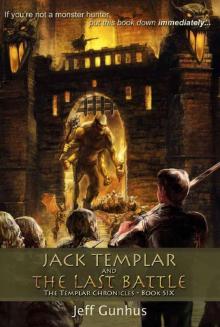 Jack Templar and the Last Battle
Jack Templar and the Last Battle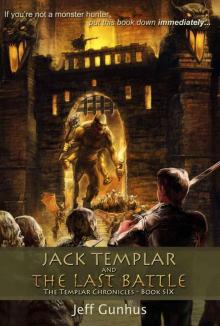 Jack Templar and the Last Battle (The Jack Templar Chronicles Book 6)
Jack Templar and the Last Battle (The Jack Templar Chronicles Book 6)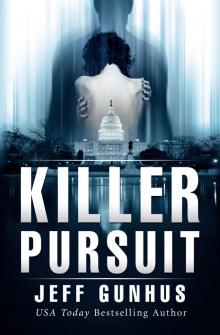 Killer Pursuit: An Allison McNeil Thriller
Killer Pursuit: An Allison McNeil Thriller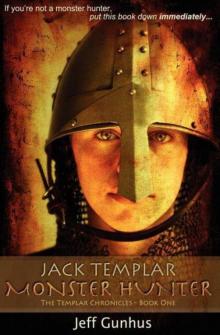 Jack Templar Monster Hunter
Jack Templar Monster Hunter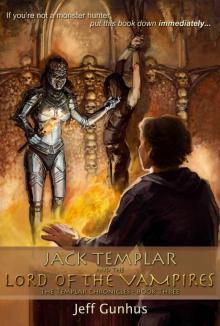 Jack Templar And The Lord Of The Vampires (The Templar Chronicles)
Jack Templar And The Lord Of The Vampires (The Templar Chronicles)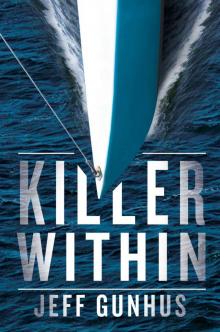 Killer Within
Killer Within The Torment of Rachel Ames
The Torment of Rachel Ames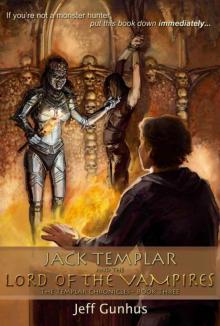 Jack Templar and the Lord of the Vampires
Jack Templar and the Lord of the Vampires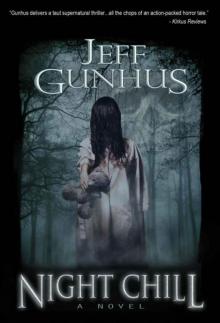 Night Chill
Night Chill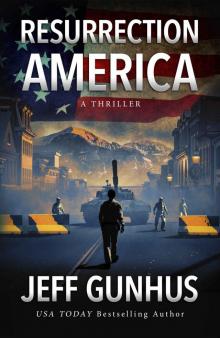 Resurrection America
Resurrection America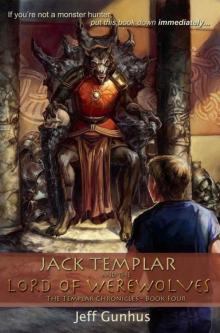 Jack Templar and the Lord of the Werewolves (Book #4 of the Templar Chronicles)
Jack Templar and the Lord of the Werewolves (Book #4 of the Templar Chronicles)